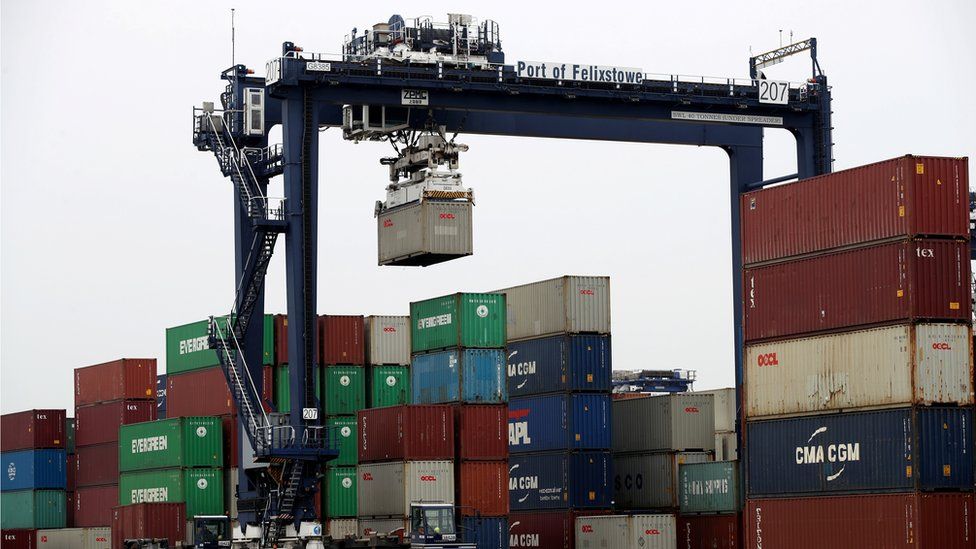ARTICLE AD BOX
 Image source, Reuters
Image source, Reuters
The freeports are expected to be operational by the end of the year
By Huw Thomas
Business correspondent, BBC Wales
Two Welsh freeports are to be created which aim to bring 20,000 jobs and investment worth £5bn.
Bids from Celtic Freeport, at Milford Haven and Port Talbot, and Anglesey Freeport have been given the green light by the UK and Welsh governments.
Freeports are zones where companies benefit from tax and duty relief and simplified customs processes.
Each was chosen to exploit renewable energy opportunities and are expected to contribute to UK net-zero ambitions.
A freeport allows goods to be brought in with less red tape, and then new products made with those goods are exported without heavy export charges.
The BBC has been told Celtic Freeport's bid scored highest during the competition run by the UK and Welsh governments.
It was based around maximising local benefits of a separate plan for a floating off-shore wind project in the Celtic Sea.
According to official figures, Wales had an export trade worth £115bn between 2016 and December 2022.
Image source, 10 Downing Street
Image caption,Prime Minister Rishi Sunak speaks to RAF air cadets during his visit to RAF Valley on Anglesey on Wednesday
A third bid, based around Newport and Cardiff Airport, failed.
Celtic Freeport will be based around Port Talbot and Milford Haven ports, in the counties of Neath Port Talbot and Pembrokeshire respectively.
Anglesey Freeport will be based around Holyhead, Rhosgoch, Anglesey prosperity zone, and science park M-Sparc.
Image source, ABP
Image caption,The Celtic Freeport will be based around the ports of Port Talbot, pictured, and Milford Haven
Celtic Freeport Consortium chairman Roger Maggs said there was now potential to access £5.5bn of private and public investment.
"The future is exciting," he said.
Tata Steel, which has a site in Port Talbot, said it was delighted the Celtic Freeport bid was successful.
Pembrokeshire council leader David Simpson said Celtic Freeport would unleash "green industrial potential".
Neath Port Talbot council leader Steve Hunt said it was "an absolute game changer" for his county and Wales.
Anglesey council leader Llinos Medi said freeport status would be an important driver in securing a brighter future for Ynys Môn and north Wales.
"Too many of our young people have had to leave their communities to find decent jobs and a secure future. We want that to change, and freeport can help."
Anglesey MP Virginia Crosbie said: "The investment and jobs that await freeport status will transform lives and lead to thousands of high-quality jobs so our young do not have to leave."
CBI Wales director Ian Price called it a "double boost for the economies and communities in both north and south Wales".
Freeports were introduced by the UK government to try to promote regeneration and jobs.
Eight have been created in England and two announced in Scotland.
However the UK government's budget watchdog, the Office for Budgetary Responsibility has said historical evidence suggests freeports' "main effect" will be to move economic activity from one place to another.
Responding to such concerns, Welsh Secretary David TC Davies said the two new freeports had specific roles and were set at certain distances to avoid the risk they suck up investment from other parts of Wales.
"They are not going to be taking jobs from elsewhere," he said. "They're going to be building prosperity into areas that desperately need and frankly deserve it."
He said the 20,000 jobs figure had been rigorously assessed, but conceded it would take "up to 2030 and beyond" to create them.
"It will take time for these areas to ramp up and get used to changes," he said.
'Fresh opportunities'
The UK government will provide up to £26m funding for each of the Welsh freeports.
UK Prime Minister Rishi Sunak was in Anglesey on Wednesday. On Thursday he and Wales' First Minister Mark Drakeford are expected to meet to officially announce the freeports.
Mr Sunak said they would provide fresh opportunities.
"Everyone deserves equality of opportunity and working closely with the Welsh government has helped to deliver these fantastic new sites," he said.
Image source, AFP
Image caption,Holyhead has expressed an interest in gaining freeport status
Mr Drakeford said the freeports were expected to be operational by the end of the year, and that his government wanted Wales' economy to be "stronger, fairer and greener".
He said: "The designation of these sites as Wales' first freeports will reinforce that mission, building on the significant investments and partnerships we have made in these regions over many years."
What is a freeport?
At the moment, importers of goods or raw materials that enter the UK have to pay taxes or tariffs.
There is no single definition of a freeport but in general it means that companies importing products into the freeport do not have to pay any taxes when they bring them in.
If they use those products to make something else and then export it, they do not have to pay any taxes. They would only have to pay them if the product left the freeport and entered the UK.
A freeport is effectively outside a country's customs borders.
In England, businesses in freeports also have cheaper business rates, but in Wales that would be up to the Welsh government.
Image source, Getty Images
Image caption,Applications for Wales' first freeport have to be submitted by 24 November
They also pay a lower rate of national insurance for new staff.
The argument in favour of freeports is that they create new jobs and attract investment.
But critics argue they do not create new jobs but simply encourage businesses to move from one location to another.

 1 year ago
17
1 year ago
17








 English (US)
English (US)